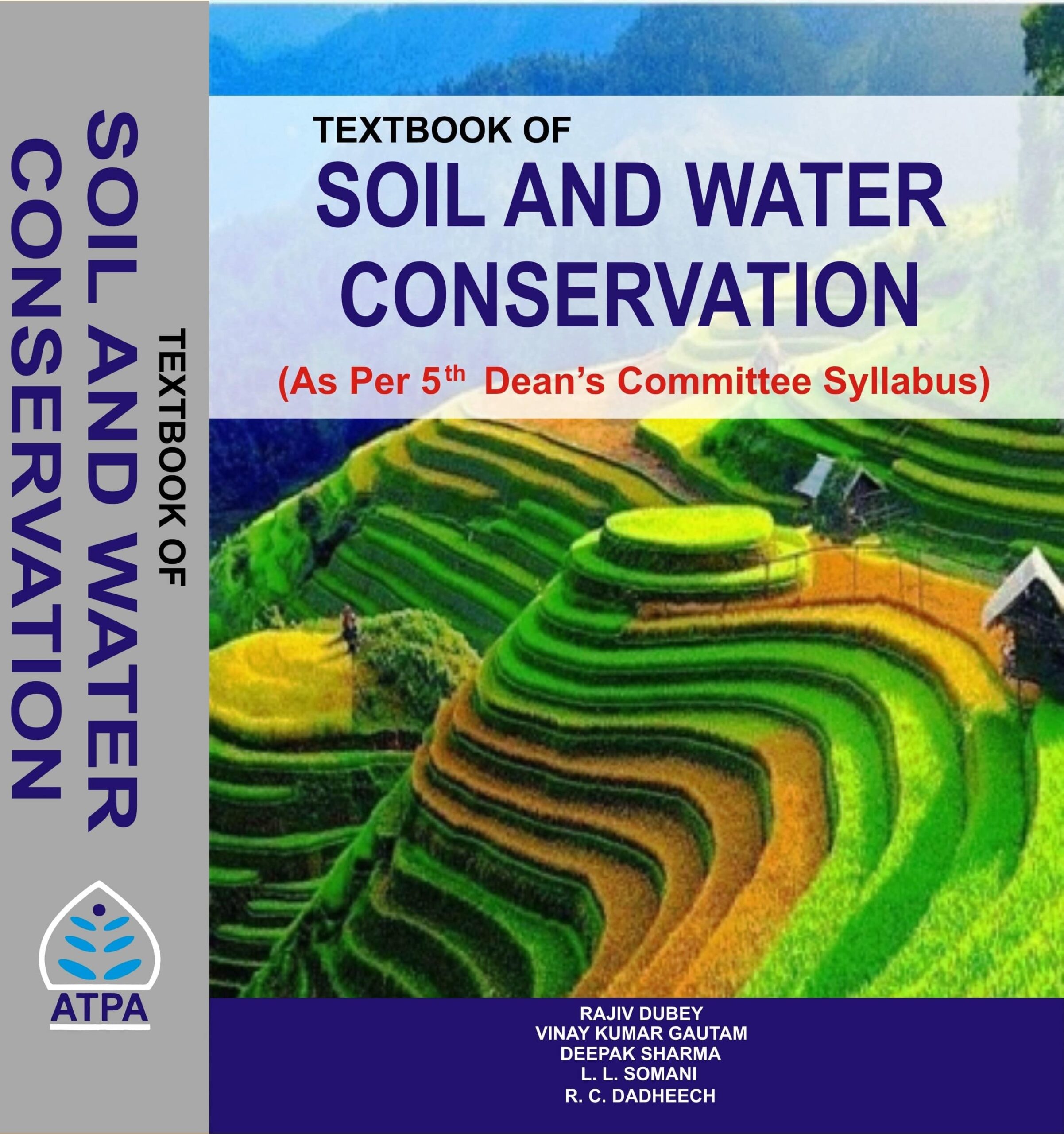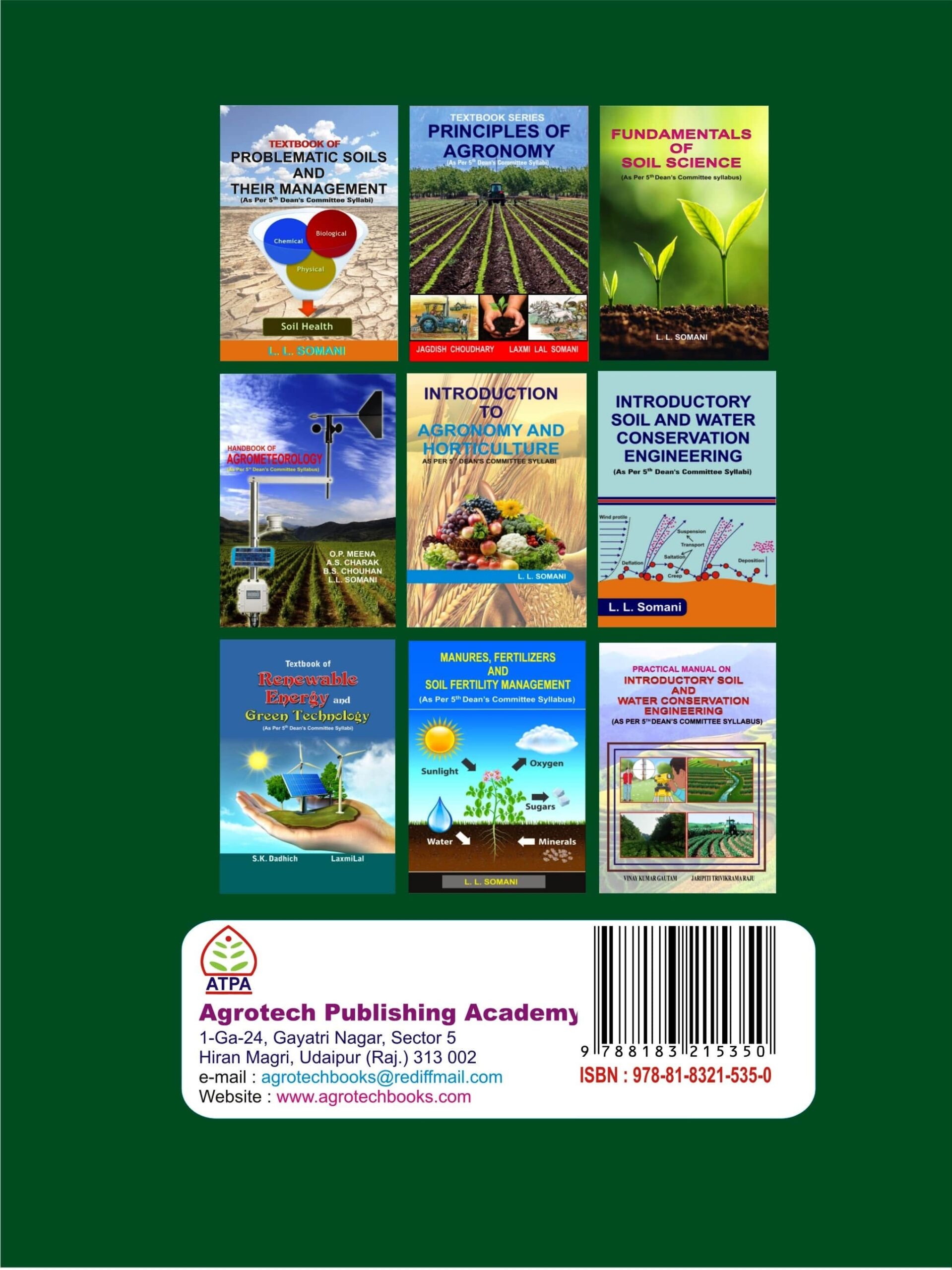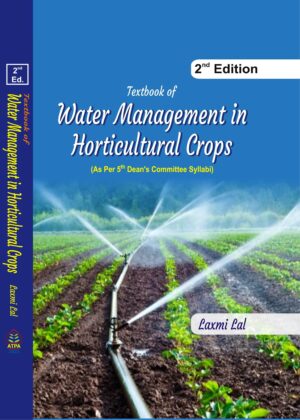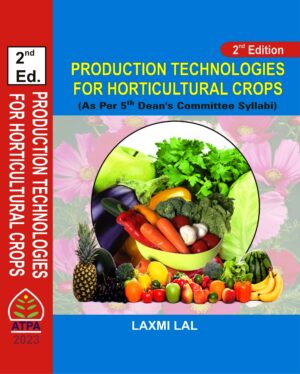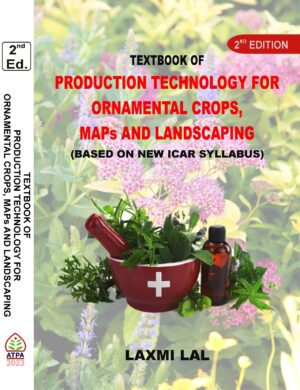TEXTBOOK OF SOIL AND WATER CONSERVATION
₹1,250.00
AUTHORS: RAJIV DUBEY, VINAY KUMAR GAUTAM, DEEPAK SHARMA, LAXMI L. SOMANI AND R.C. DADHEECH
PUBLISHING YEAR: 2020
ISBN: 9788183215350
© All Rights Reserved
Description
ABOUT THE BOOK
Of all the gifts of nature, none is more indispensable to human beings than soil. Along with sunlight, air and water, soil nourishes plant life and support human and animal life.
Soil is the upper most layer of earth’s crust lying over the rocky core of the earth at different depths. It consists of weathered and disintegrated minerals mixed with organic substances and is capable of sustaining plant life. Top soil is the most vital part of soil. The upper 15-20 cm depth of soil is the principal feeding zone of the plants, which provide food for human or livestock consumption, fibre for cloth, and timber for shelter. The wealth and the culture of a country depend upon its top soil.
The upper most 30-45 cm of surface soil in the first place is the major zone of root development, it carries much of the nutrients available to plants, and it supplies a large share of water used by crops/ plants. Second, as the layer, which is ploughed and cultivated, it is subject to manipulation and management. Thus, the very existence of humankind depends on conserving/ protecting this vital resource.
Soil erosion results in on-site loss of agricultural production through reduced infiltration and moisture holding capacity of the soil, reduced depth of top soil and loss of nutrients; and off-site in increased sedimentation through downstream siltation of irrigation canals, farmlands, water bodies, reservoirs, thus, affecting water quality and fisheries, formation of sand dunes, etc., and flooding and decrease in dry season stream flow.
Introductory soil and water conservation is the application is the application soil and water management principles to the solution of problems relating to water erosion, wind erosion, measurement and estimation of erosion soil loss), erosion control measures and water harvesting as prescribed by 5th dean’s committee For UG students of SAUs and Agriculture Colleges throughout the country.
CONTENT
| S. No. | Title | Page |
| Preface | 3-4 | |
| Syllabus | 6 | |
| About the book | 7 | |
| About the authors | 8-9 | |
| CHAPTERS | ||
| 1 | Introduction to Soil and Water Conservation | 11-20 |
| 2 | Causes of Soil Erosion: Definition And Agents Of Soil Erosion | 21-45 |
| 3 | Water Erosion: Forms of Water Erosion, Gully Classification and Control Measures | 46-100 |
| 4 | Runoff Computation And Universal Soil Loss Equation | 101-125 |
| 5 | Measurement of Soil Loss | 126-134 |
| 6 | Principles of Water Erosion Control: Agronomic | 135-187 |
| 7 | Grassed Waterways and Their Design | 188-212 |
| 8 | Water Harvesting and Its Techniques | 213-301 |
| 9 | Wind Erosion: Mechanics of Wind Erosion, Types of Soil Movement | 302-327 |
| 10 | Principles of Wind Erosion Control | 328-359 |
| 11 | Formation and Stabilisation of Sand Dunes | 360-392 |
| 12 | Land Capability Classification. | 393-402 |
| 13 | Rate of Sedimentation, Silt Monitoring and Storage Loss in Tanks. | 403-422 |
| Literature Cited | 423-424 | |
ABOUT THE AUTHORS
Dr. Rajiv Dubey is working as Assistant Professor at K.N.K. College of Horticulture, Mandsaur (MP). He did his B.Sc. (Ag) and M.Sc. (Agronomy) from JNKVV, Jabalpur (M.P.) during year 2006 and 2008, respectively. He acquired Doctorate from GBPUA&T, Pantnagar (U.K.). He received Best M.Sc. Thesis Award (2009-10) by Indian Society of Weed Science, Jabalpur and Young Scientist Award (2012) by Uttarakhand Council of Science & Technology, Dehradun for best Ph.D. research work. He qualified ICAR-NET (Agronomy) in 2010. He is a life time member of Indian Society of Weed Science, Jabalpur.
He has participated and presented papers in various National and International conferences, seminar, symposium, workshop and congress held in India. He has been associated with extension activities, professional societies and published research papers in National and International Journals of repute and technical articles in reputed agricultural magazines.
Er. Vinay Kumar Gautam is presently pursuing Ph.D. from the College of Technology and Engineering, Maharana Pratap University of Agriculture and Technology (MPUAT), Udaipur (Raj.) in the discipline of Soil and Water Conservation Engineering. He has completed M.Tech (SWE) from JNKVV, Jabalpur (M.P.) in 2018 and B.Tech (Agricultural Engineering) from MGCGVV, Chitrakoot (M.P.) in 2016. He had also qualified the Junior Research Fellowship (ICAR-JRF) in 2016. He has already published a practical manual on Soil and Water Conservation Engineering. He had also presented the research papers in many national and international seminar, conferences and trainings on Soil and Water Conservation Engineering, Irrigation Engineering and Groundwater Engineering. He is also a life time member of Soil Conservation Society of India and Indian Society of Agricultural Engineers, New Delhi.
Prof. Deepak Sharma (Ph.D, FIE) has more than 36 years experience of teaching undergraduate and post graduate engineering students in renewable energy engineering discipline. He is also engaged in research, extension and popularization of renewable and sustainable energy solutions amongst farmers, entrepreneurs, industrialists and general masses. Prof. Sharma is presently working as Professor and Principal Investigator in the Department of Renewable Energy Engineering, College of Technology and Engineering, MPUAT, Udaipur. He has guided four Ph.D. scholars, 19 M. Tech. Students and has authored 33 research publications in reputed International/ national journals. Dr. Deepak Sharma have attended International course on Energy Management in Small and Medium Scale Industries under Netherlands Fellowship Programme at the Netherlands (Sept-Oct, 2003), 2 weeks short term course on Gender and Energy at Kathmandu Nepal (2006) , International Renewable Energy Conference at Bangkok, Thailand (2009), etc. Prof. Sharma is recipient of Rajasthan Energy Conservation Award-2017 by the Government of Rajasthan and Commendation Medal Award by the Indian Society of Agricultural Engineers (2005-06). Dr. Sharma is Governing Council Executive Member of Solar Energy Society of India, New Delhi (2018-19) and Divisional Editor of Journal of Agricultural Engineering
Prof. (Dr.) L.L. Somani (b. 1945) Retired Director (Rl) & Dean PG Studies, MPUAT Udaipur has over 400 papers published in National and International Journals/ Symposia, etc. he is the author of well known DICTIONARY OF AGRICULTURAL ENGINEERING (in nine parts) and INTRODUCTORY SOIL AND WATER CONSERVATION ENGINEERING . He has authored a number of books to his credit in different disciplines of Agriculture and allied field. He held different positions in MPUAT, has spreaded highly innovative ideas, and programmes for development of Agriculture. Prof. Somani has been honoured with several awards.
Dr. Ramesh Chandra Dadheech is retired Professor of Agronomy, MPUAT, Udaipur. He has long teaching, research and extension experience. He has published 160 research papers and technical articles in journals of national and international repute. He has guided nineteen students for their PG theses. He is the author of MANUAL OF AGROFORESTRY AND SOCIAL FORESTRY.
Additional information
| AUTHOR/AUTHORS | DEEPAK SHARMA, LAXMI L. SOMANI, R.C. DADHEECH, RAJIV DUBEY, VINAY KUMAR GAUTAM |
|---|---|
| PAGES | 424 |
| BINDING | Hard Back |
| PUBLICATION YEAR | 2020 |

